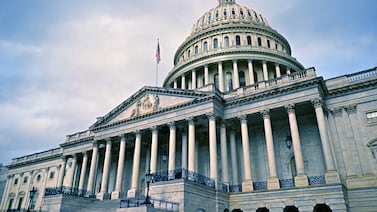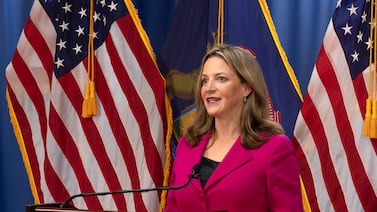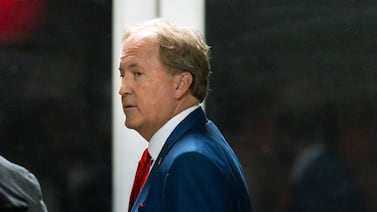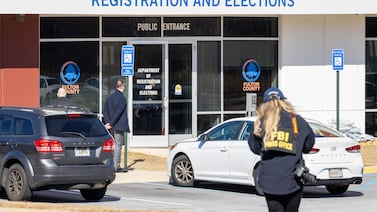Votebeat is a nonprofit news organization reporting on voting access and election administration across the U.S. Sign up for Votebeat Arizona’s free newsletter here.
In Arizona, where distrust in elections runs high, many people agree that a manual check of election results could help boost confidence. And state law requires counties to do such audits.
Yet they aren’t always happening.
That’s because state law has strict conditions on who appoints the workers, who participates, and when it happens. If those conditions can’t be met, the elections director cancels the audit.
Lawmakers have tried to change state law before to make sure the audits — which examine votes cast on a certain percentage of ballots in a set number of races — actually happen in each county. This year, they are trying again.
Gov. Katie Hobbs signed a bill last month, House Bill 2129, that tweaks a provision in the law to try to ensure that counties have enough workers for the audit. It was a rare example of Hobbs, a Democrat, signing an election related bill from the Republican-led Legislature, rather than offering a swift veto. The bill was supported by the Secretary of State’s Office and included other small changes to election law.
It’s unclear, though, whether the change will be enough to ensure the audits happen now.
Role of political parties complicates the process
Arizona requires the major political parties to appoint workers to bipartisan teams that must start the audit within 24 hours of polls closing. The audit can proceed only if no more than 75% of the workers who show up are from the same political party. Otherwise, the elections director cancels the audit.
That’s in contrast to many other states, which use county workers to run the audits, with a more lax timeline and no bipartisanship requirement, a Votebeat review of state laws found. Many states do require that political parties and the public be allowed to observe.
The way Arizona involves political parties means that in smaller counties, where it’s generally harder to find political volunteers, the audit sometimes doesn’t happen, even when there’s heightened interest in ensuring the integrity of the results. In the November 2022 midterm election, for example, after Donald Trump’s high-profile 2020 loss in the state, three counties — Apache, Graham, and La Paz, among the state’s least populous — still canceled audits due to a lack of bipartisan team.
That spurred Hobbs to sign Senate Bill 1342 last year, legislation that picked up bipartisan support in the Legislature and was favored by voting rights groups. The law said that if the county political party does not appoint enough workers, the state party chair could do so on their behalf. And if the county and state party both failed to do so, the top elected official in the state from that party could do it.
“Well-designed post-election tabulation audits can provide solid evidence to support the reported election outcome,” representatives from voting organizations Verified Voting and Common Cause Arizona wrote at the time in support of the bill. “We know that the eyes of the nation will once again be on Arizona in November and by enacting this legislation, with every county able to conduct their routine post-election audit, the state will be well positioned to stand up the election results.”
But Gina Swoboda, chairwoman of the Arizona Republican Party, said last year’s legislation didn’t account for what would happen if the party did initially appoint enough people, but then those workers didn’t show up. That’s what happened in La Paz County in November’s presidential election, she said.
And it happened in Apache County, too, according to state records. Again, both counties had to cancel their audits.
Swoboda said she worked on this year’s bill, in her capacity as a legislative consultant to Senate Republicans, after realizing that loophole existed.
The new law says that if the appointed workers do not show up, the county chairperson or state chairperson of each party may select persons from any political party to work, as long as the audit team as a whole has no more than 75% of workers from the same political party.
Some see more room for improvement in audits
It still might be difficult for counties to get the correct number of people, given the tight timeline for when the audit must start. The new law doesn’t change the 24-hour clock.
And while Arizona’s divided government was able to come together for this small tweak on the audit law, many advocates are calling for larger changes to the way the state verifies election results.
The current audits examine a mix of early ballots and Election Day ballots. For early ballots, the audit covers 1% of the ballots, or 5,000 of them. For Election Day ballots, it looks at 2% of the ballots, or ballots from two precincts.
Merissa Hamilton, founder and chairwoman of grassroots election integrity group EZAZ.org said that the state should be auditing a higher percentage of ballots — a number that’s statistically significant.
Likewise, Jenny Guzman, program director of Common Cause Arizona, said her group supports risk-limiting audits, which determine how many ballots to examine based on the winning margin in each race. This, paired with other audits already being conducted, is the most cost-effective and statistically sound way to build confidence, she said.
“What improves voter confidence is audits that are backed by science, and backed by experts,” she said.
Jen Fifield is a reporter for Votebeat based in Arizona. Contact Jen at jfifield@votebeat.org.





